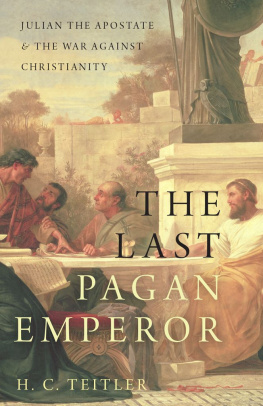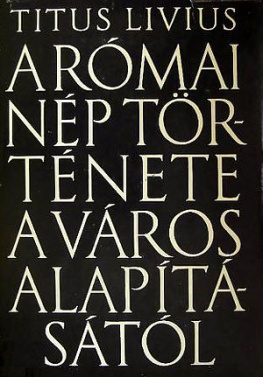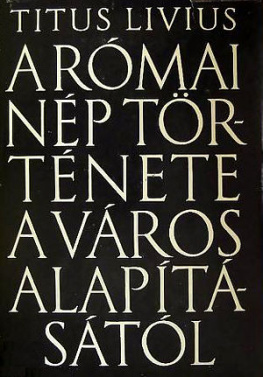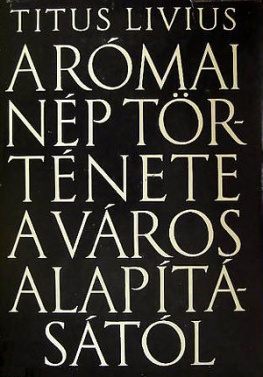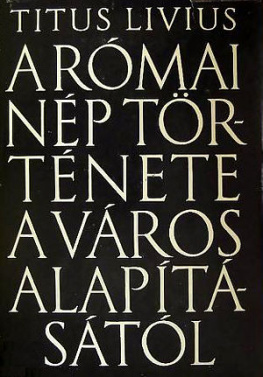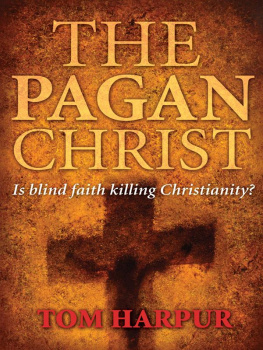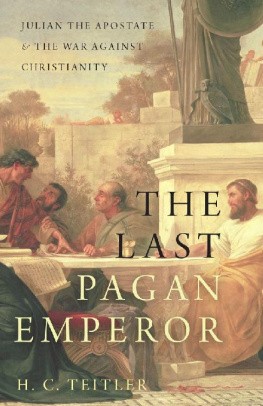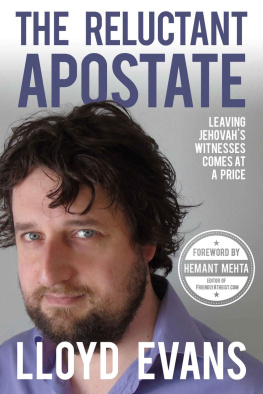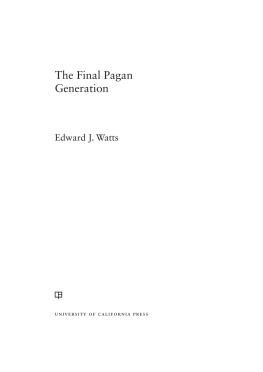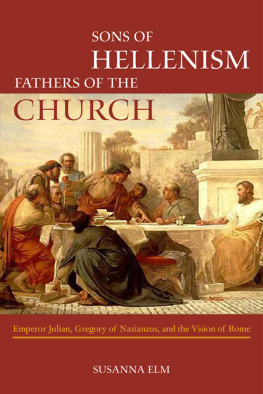THE LAST PAGAN EMPEROR

Oxford University Press is a department of the University of Oxford. It furthers the Universitys objective of excellence in research, scholarship, and education by publishing worldwide. Oxford is a registered trade mark of Oxford University Press in the UK and certain other countries.
Published in the United States of America by Oxford University Press
198 Madison Avenue, New York, NY 10016, United States of America.
Oxford University Press 2017
Originally published as Julianus de Afvallige by H.C. Teitler, Copyright 2009 First published in 2009 by AthenaeumPolak & Van Gennep, Amsterdam
All rights reserved. No part of this publication may be reproduced, stored in a retrieval system, or transmitted, in any form or by any means, without the prior permission in writing of Oxford University Press, or as expressly permitted by law, by license, or under terms agreed with the appropriate reproduction rights organization. Inquiries concerning reproduction outside the scope of the above should be sent to the Rights Department, Oxford University Press, at the address above.
You must not circulate this work in any other form and you must impose this same condition on any acquirer.
Library of Congress Cataloging-in-Publication Data
Names: Teitler, H. C., author.
Title: The last pagan emperor : Julian the Apostate and the war against Christianity / H. C. Teitler.
Other titles: Julianus de Afvallige. English
Description: New York : Oxford University Press, 2017. | Includes bibliographical references and index.
Identifiers: LCCN 2016027844 | ISBN 9780190626501 (hardback) | ISBN 9780190626525 (epub) | ISBN 9780190626532 (online component)
Subjects: LCSH: Julian, Emperor of Rome, 331363Religion. | Church and state Rome. | Church historyPrimitive and early church, ca. 30600. | PaganismRome.
Classification: LCC DG317 .T4513 2017 | DDC 937/.08092 [B]dc23 LC record available at https://lccn.loc.gov/2016027844
In memory of Rik van der Steeg
CONTENTS
,
A big book is a big misfortune Callimachus, fr. 465 Pfeiffer, trans. A. W. Bulloch
My interest in trying to gain an in-depth knowledge of the conflict between Christians and pagans during the reign of the Emperor Julian, and in particular of its aftermath, stems from reading Gaiffiers Sub Iuliano Apostata dans le Martyrologe Romain (Julian the Apostate in the Roman Martyrology).
I came across Gaiffiers revelatory article, which appeared in 1956, at the end of the 1980s, but my acquaintance with the Apostate dates from the days when, as a student, I read Gore Vidals novel Julian (1964). In the 1960s the history of Late Antiquity and its civilization were hardly taught at the University of Amsterdam. However, A. D. Leeman, my professor of Latin and a genuine vir Ciceronianus, advised me to read at least one book of Ammianus Marcellinus, in order to discover how ugly the style of this fourth-century historian is. Many years later, when I became a member of the Dutch team of commentators on Ammianus Res Gestae (so far eleven volumes have appeared), I renewed my acquaintance with both Ammianus and Julian: Books 20 through 25 of the Res Gestae are mainly concerned with Julians rise to supreme power, his brief reign as sole emperor (361363 CE), and his untimely death during his ill-starred Persian campaign.
The literature on the apostate emperor, by scholars as well as by nonspecialists, is quite extensive. Elms book (2012) deserves pride of place. There are also fine biographies: Bidez (1930), Browning (1976), Bowersock (1978), Bringmann (2004), and, above all, Rosen (2006). I should therefore make it clear from the outset that my book is not a biography in the proper sense, and that there are several important aspects of Julians rule that I shall either not address at all or touch on only in passing. This book focuses on that aspect of the Apostates reign which earned him his nickname: Julians relationship with the Christians. In his attempt to revive paganism the emperor incurred the profound hatred of the Christians, who often, especially after his death, accused him of being a bloodthirsty persecutor. This hatred found a special expression in what the Belgian scholar Hippolyte Delehaye has called passions piques, that is, tales of sufferings that are chiefly fictitious. I shall make more use of these texts than most others have done in books about Julian.
Without my work on Ammianus this book could not have been written. I am therefore grateful to my fellow viri Ammianei, Jan den Boeft, Danil den Hengst, and Jan Willem Drijvers, who are not only wonderful colleagues, but also good friends. Thanks are also due to still older friends, to Jan Bremmer, who stimulated me to make a translation of the text that originally, although in a shorter form, appeared in Dutch, and to Ines van de Wetering, who corrected my English. I thank Raphael Brendel for his many useful bibliographical suggestions and Erika Manders for her help in numismatical matters. Finally and above all, I express gratitude to my Geertje for more than thirty years of love and support.
| AASS | Acta Sanctorum, ed. H. Rosweyde, J. Bolland et al., 68 vols., Antwerp and Brussels: 16431940. |
| Act. | Acta Apostolorum. |
| AE | LAnne pigraphique, Paris: 1888. |
| Ambrosiast. | Ambrosiasters Commentary to Pauls Comm. II Thess. Second Letter to the Thessalonians. Ambrosiastri qui dicitur Commentarius in Epistulas Paulinas, ed. H. J. Vogels, V. Bulhart, and R. Hanslik (CSEL 81, pt. 13). Vienna: 1966. Ambr. Ep. Ambrosius, Epistulae et acta, ed. O. Faller (CSEL 82), Vienna: 1968. |
| Ambr. Obit. Valent. | Ambrosius, De Obitu Valentiniani, ed. O. Faller (CSEL 73), Vienna: 1955. |
| Amm. | Ammiani Marcellini rerum gestarum libri qui supersunt, ed. W. Seyfarth, with L. Jacob-Karau and I. Ulmann (Bibliotheca Scriptorum Graecorum et Romanorum Teubneriana), 2 vols., Leipzig: 1978; Ammianus Marcellinus, with an English Translation, ed. J. C. Rolfe, 3 vols., Cambridge, MA, and London: 19351939; Ammien Marcellin, Histoire (Collection des Universits de France), Introduction, Texte, Traduction, Notes, I (Livres XIVXVI), ed. E. Galletier, avec la collaboration de J. Fontaine, Paris: 19782; II (Livres XVIIXIX), ed. G. Sabbah, Paris: 1970; III (Livres XXXII), ed. J. Fontaine, avec la collaboration de E. Frzouls et J.-D. Berger, Paris: 1996; IV.1 and IV.2 (Livres XXIIIXXV), ed. J. Fontaine, Paris: 1977; V (Livres XXVIXXVIII), ed. M.-A. Mari, Paris: 1984; VI (Livres XXIXXXXI), ed. G. Sabbah (Introduction, Texte, et Traduction) and L. Angliviel de la Beaumelle (Notes), Paris: 1999. |
| Art. pass. | Artemii passio (BHG 170171c), ed. B. Kotter, in B. Kotter, Die Schriften des Johannes von Damaskos V: Opera homiletica et hagiographica (Patristische Texte und Studien 29), Berlin and New York: 1988, 185245; [John the Monk], Artemii passio (The Ordeal of Artemius, BHG 17071c, CPG 8082), translated by M. Vermes, in S. N. C. Lieu and D. Montserrat, From Constantine to Julian. Pagan and Byzantine Views: A Source History |

